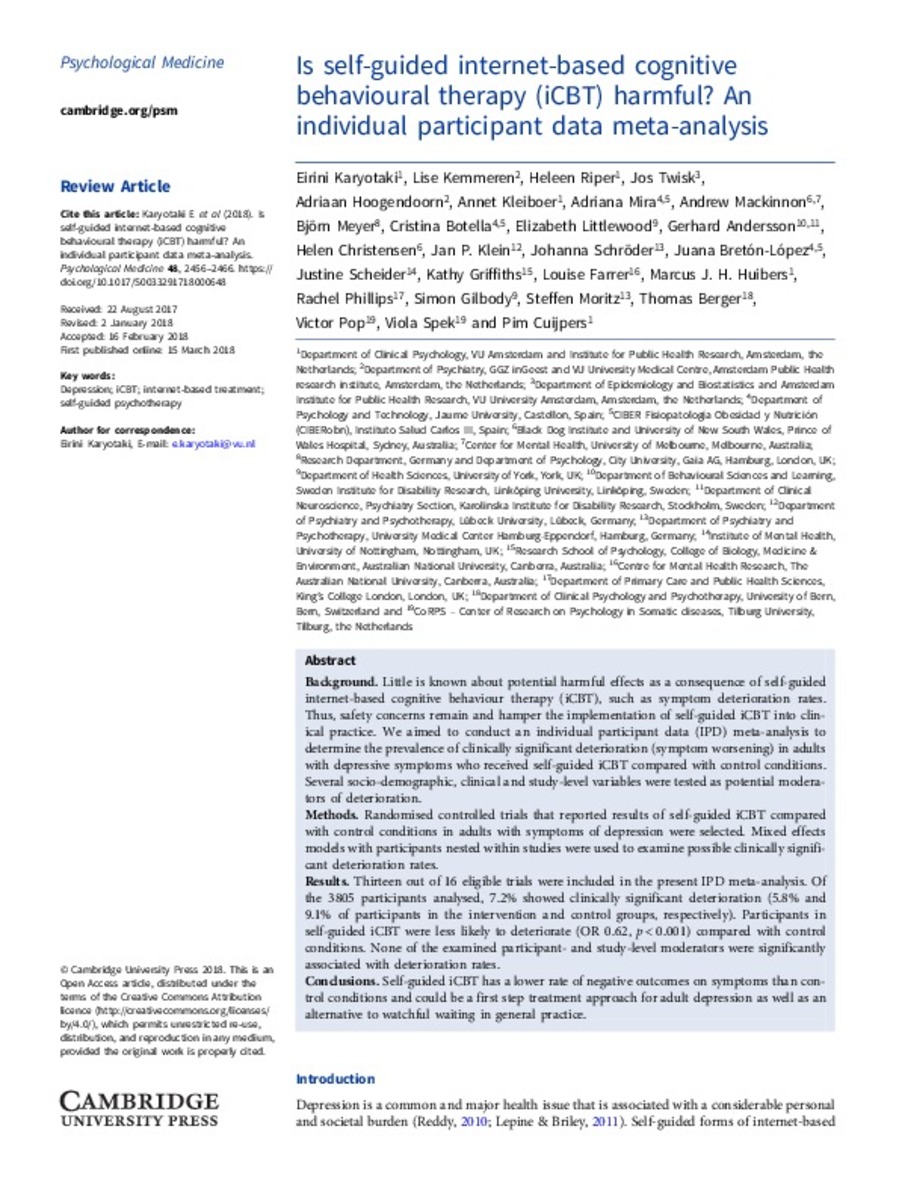Mostrar el registro sencillo del ítem
Is self-guided internet-based cognitive behavioural therapy (iCBT) harmful? An individual participant data meta-analysis
| dc.contributor.author | Karyotaki, Eirini | |
| dc.contributor.author | Kemmeren, Lise | |
| dc.contributor.author | Riper, Heleen | |
| dc.contributor.author | Twisk, Jos | |
| dc.contributor.author | Hoogendoorn, Adriaan | |
| dc.contributor.author | Kleiboer, Annet | |
| dc.contributor.author | Mira, Adriana | |
| dc.contributor.author | Mackinnon, Andrew | |
| dc.contributor.author | Meyer, Björn | |
| dc.contributor.author | Botella, Cristina | |
| dc.contributor.author | Littlewood, Elizabeth | |
| dc.contributor.author | Andersson, Gerhard | |
| dc.contributor.author | Christensen, Helen | |
| dc.contributor.author | Klein, Jan P. | |
| dc.contributor.author | Schröder, Johanna | |
| dc.contributor.author | Bretón-López, Juana | |
| dc.contributor.author | Scheider, Justine | |
| dc.contributor.author | Griffiths, Kathy | |
| dc.contributor.author | Farrer, Louise | |
| dc.contributor.author | Huibers, Marcus J. H. | |
| dc.contributor.author | Phillips, Rachel | |
| dc.contributor.author | Gilbody, Simon | |
| dc.contributor.author | Moritz, Steffen | |
| dc.contributor.author | Berger, Thomas | |
| dc.contributor.author | Pop, Victor | |
| dc.contributor.author | Spek, Viola | |
| dc.contributor.author | Cuijpers, Pim | |
| dc.date.accessioned | 2018-12-03T11:51:58Z | |
| dc.date.available | 2018-12-03T11:51:58Z | |
| dc.date.issued | 2018 | |
| dc.identifier.citation | Karyotaki E et al (2018). Is self-guided internet-based cognitive behavioural therapy (iCBT) harmful? An individual participant data meta-analysis. Psychological Medicine 48, 2456–2466. https:// doi.org/10.1017/S0033291718000648 | ca_CA |
| dc.identifier.issn | 0033-2917 | |
| dc.identifier.issn | 1469-8978 | |
| dc.identifier.uri | http://hdl.handle.net/10234/177849 | |
| dc.description.abstract | Background. Little is known about potential harmful effects as a consequence of self-guided internet-based cognitive behaviour therapy (iCBT), such as symptom deterioration rates. Thus, safety concerns remain and hamper the implementation of self-guided iCBT into clinical practice. We aimed to conduct an individual participant data (IPD) meta-analysis to determine the prevalence of clinically significant deterioration (symptom worsening) in adults with depressive symptoms who received self-guided iCBT compared with control conditions. Several socio-demographic, clinical and study-level variables were tested as potential moderators of deterioration. Methods. Randomised controlled trials that reported results of self-guided iCBT compared with control conditions in adults with symptoms of depression were selected. Mixed effects models with participants nested within studies were used to examine possible clinically significant deterioration rates. Results. Thirteen out of 16 eligible trials were included in the present IPD meta-analysis. Of the 3805 participants analysed, 7.2% showed clinically significant deterioration (5.8% and 9.1% of participants in the intervention and control groups, respectively). Participants in self-guided iCBT were less likely to deteriorate (OR 0.62, p < 0.001) compared with control conditions. None of the examined participant- and study-level moderators were significantly associated with deterioration rates. Conclusions. Self-guided iCBT has a lower rate of negative outcomes on symptoms than control conditions and could be a first step treatment approach for adult depression as well as an alternative to watchful waiting in general practice. | ca_CA |
| dc.format.extent | 11 p. | ca_CA |
| dc.format.mimetype | application/pdf | ca_CA |
| dc.language.iso | eng | ca_CA |
| dc.publisher | Cambridge University Press | ca_CA |
| dc.relation.isPartOf | Psychological Medicine, Volume 48, Issue 15, 2018 | ca_CA |
| dc.rights | © Cambridge University Press 2018. This is an Open Access article, distributed under the terms of the Creative Commons Attribution licence (http://creativecommons.org/licenses/ by/4.0/), which permits unrestricted re-use, distribution, and reproduction in any medium, provided the original work is properly cited. | ca_CA |
| dc.rights | Atribución 4.0 Internacional | * |
| dc.rights.uri | http://creativecommons.org/licenses/by-sa/4.0/ | * |
| dc.subject | Depression | ca_CA |
| dc.subject | iCBT | ca_CA |
| dc.subject | internet-based treatment | ca_CA |
| dc.subject | self-guided psychotherapy | ca_CA |
| dc.title | Is self-guided internet-based cognitive behavioural therapy (iCBT) harmful? An individual participant data meta-analysis | ca_CA |
| dc.type | info:eu-repo/semantics/article | ca_CA |
| dc.identifier.doi | https://doi.org/10.1017/S0033291718000648 | |
| dc.relation.projectID | grant 603098 for the E-COMPARED project | ca_CA |
| dc.rights.accessRights | info:eu-repo/semantics/openAccess | ca_CA |
| dc.relation.publisherVersion | https://www.cambridge.org/core/journals/psychological-medicine/article/is-selfguided-internetbased-cognitive-behavioural-therapy-icbt-harmful-an-individual-participant-data-metaanalysis/DD4EAB9AF94E1836BA97FF26FC70A17F | ca_CA |
| dc.type.version | info:eu-repo/semantics/publishedVersion | ca_CA |
Ficheros en el ítem
Este ítem aparece en la(s) siguiente(s) colección(ones)
-
PSB_Articles [1292]
Articles de publicacions periòdiques
Excepto si se señala otra cosa, la licencia del ítem se describe como: © Cambridge University Press 2018. This is an
Open Access article, distributed under the
terms of the Creative Commons Attribution
licence (http://creativecommons.org/licenses/
by/4.0/), which permits unrestricted re-use,
distribution, and reproduction in any medium,
provided the original work is properly cited.








